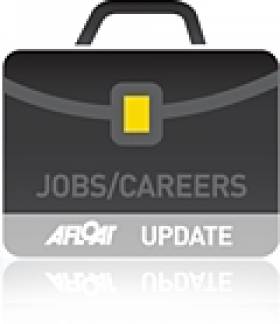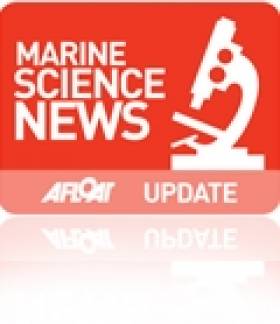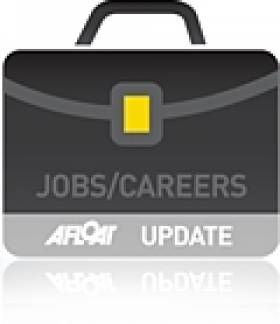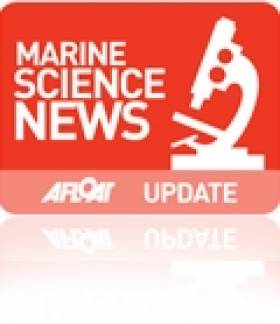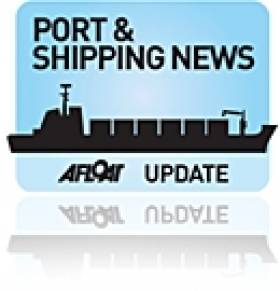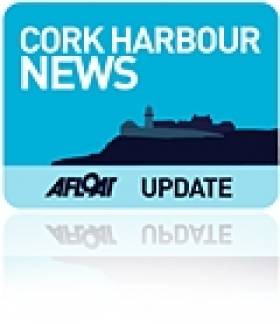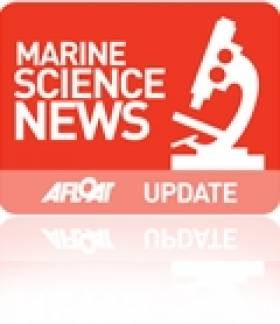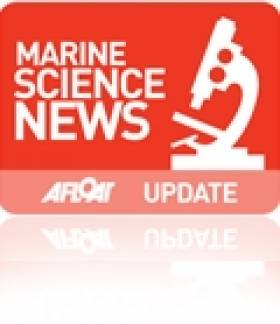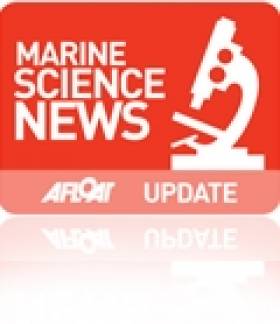Displaying items by tag: Marine Institute
Deadlines Approaching For Marine Institute Roles
#Jobs - Deadlines to apply for a number of jobs with the Marine Institute are coming up over the next two weeks.
Those interested in the role of Oceanographic Services Manager have until 5pm today (Wednesday 1 July) to submit their applications.
Tomorrow (Thursday 2 July) at 5pm is the closing date for two Team Leader positions, in Data Management and Software Development.
Graduates interested in the role of Economic Researcher should submit their CVs and cover letters by 4pm on Friday 3 July, which is also the closing date for the Cullen Fellowship for PhD students in ocean observation. Applicants for the Communications Stagiaire position have until 5pm on the same date.
Meanwhile, marine science graduates interested in the PhD opportunity in Ocean Colour and Dynamics in the Eastern Atlantic from Satellite Observations (OCEANS) have until 5pm on Wednesday 15 July to submit their applications ahead of interviews commencing the following week.
For the latest vacancies see the Marine Institute website HERE.
Students Join Marine Institute For Summer Science Placements
#MarineScience - The annual Marine Institute bursary programme gets underway this month with 23 third-level students from academic institutions in Ireland and the UK joining the institute for eight weeks.
Every year up to 150 of third-level students across Ireland apply for the Marine Institute's highly sought-after bursary programme, which is well recognised in the industry as its purpose is to promote future employment opportunities for undergraduates and postgraduates.
"The work experience programme enables students from a wide variety of disciplines to further their knowledge and research in their particular area of interest and it offers the students to expand their professional networks within Ireland and internationally," explained Helen McCormick, senior laboratory analyst at the Marine Institute and co-ordinator of the bursary programme for 2015.
The students will work in a variety of areas including fish and shellfish assessments and surveys, sampling salmon and commercial fisheries in ports, maritime economics, oceanographic equipment modifications and communications.
The placements will provide students with practical and hands-on experience at different locations around Ireland, including the offices and laboratories at the Marine Institute - Galway, Harcourt Street in Dublin and the Burrishoole Catchment at Newport, Co Mayo. Some students will also be located at fisheries ports in counties Cork and Waterford.
The summer bursary programme has been ongoing since the 1960s in the marine science sector and continues to offer a promising gateway into the expanding areas of marine science and research in Ireland.
Dr Peter Heffernan, CEO of the Marine Institute congratulated all successful bursars on this year's programme, saying: "The institute is delighted to support this excellent learning opportunity for Irish students."
Marine Institute Seek Appointments to Board
#Jobs&Careers- The Marine Institute, the State agency responsible for marine research, technology development and innovation in Ireland, is currently seeking appointments to its Board.
The Marine Institute was set up under the Marine Institute Act 1991: "to undertake, to coordinate, to promote and to assist in marine research and development and to provide such services related to research and development, that in the opinion of the Institute, will promote economic development and create employment and protect the marine environment."
The Minister for Agriculture, Food and Marine invites applications from qualified candidates for five vacancies on the board of the Marine Institute. Candidates must have demonstrable experience relevant to the work of the Institute in one or more of the following areas:
Shipping
Law
Seafood Industry Development
Scientific Research
Enterprise Development / Innovation
Candidates interested in the shipping and law opportunities should be able to demonstrate the following capabilities:
Shipping: Operational experience, at management level. in national and/or international shipping is required.
Experience in ship financing or leasing is desirable.
Law: Experience and/or knowledge of Public Administrative Law, European Environmental Law, Marine Law, or Corporate Law is required.
The closing date for submission of expressions of interest is the 24th of June 2015
For further information regarding the board appointments, consult the Stateboards.ie website HERE
#MarineScience - Following its issue by the Central Bank last year, the limited edition Silver Proof coin commemorating John Philip Holland, the Irish-born inventor of the modern submarine, was presented to Taoiseach Enda Kenny and Marine Minister Simon Coveney during their recent visit to the Marine Institute.
Highlighting the significance of Ireland's strong maritime history, Marine Institute CEO Dr Heffernan explained how this country "is at the cutting edge of international marine research driving ocean discovery and exploration.
"Supporting the Irish-led first transatlantic mapping survey from Newfoundland to Galway this coming month [June 2015], the Marine Institute's national research vessel RV Celtic Explorer will be using its extensive multibeam sonar equipment mapping parts of the Atlantic seabed."
Dr Heffrnan added: "The oceans are the life support system of our planet – producing half the oxygen we breathe; providing us with a wealth of resources including food, minerals and energy; as well as affecting our moderate climate in Ireland. It is essential that we continue to improve our understanding of how the ocean impacts our live."
By 2020, in partnership with the Atlantic Ocean Research Alliance between the EU, Canada and USA which was established by the signing of the Galway Statement in 2013, Dr Heffernan says "we aim to be able to predict the major risks and changes in the dynamics of the Atlantic Ocean.
"Just as John Philip Holland set out to discover the depths of the sea over one hundred years ago, we continue this quest of discovery and innovation through advanced technology."
Scientific Transatlantic Mapping Between Ireland & Canada Begins
#mapping – The Minister for Agriculture, Food and the Marine, Simon Coveney TD today joined with Carlos Moedas, European Commissioner for Research, Science and Innovation, and Karmenu Vella, Commissioner for Environment, Maritime Affairs and Fisheries in Brussels, along with Canada's Minister of Fisheries and Oceans Gail Shea, to announce the first trans-Atlantic mapping survey to take place under the Atlantic Ocean Research Alliance.
The Irish research vessel, RV Celtic Explorer will undertake a mapping expedition between St. John's, Newfoundland, Canada and Galway in Ireland in June of this year, as scientists from the Marine Institute, Ireland will be joined by a multi-national team made up of USA, Canadian and European ocean mapping experts. This is an important step following the agreement reached at Galway in May 2013 and is an example of scientific diplomacy in action.
Speaking from Brussels, Minister Coveney said "Information from the sea-floor is vital to the sustainable management of the Atlantic as well as to important industries such as fisheries, aquaculture and tourism. Ireland has developed a world-leading reputation for sea-bed mapping and is also very committed to the implementation of the Galway Statement and so I am delighted to put at the disposal of the team, Ireland' state-of the art research vessel-RV Celtic Explorer."
Commissioner Moedas stated "I am committed to harnessing the societal and economic value of our oceans, while protecting fragile marine ecosystems. Under Horizon 2020 we have invested just under €70 million to support the Galway Statement follow-up. The first calls delivered excellent project proposals involving international teams. I am glad that this investment is being leveraged to make our transatlantic vision a reality."
Commissioner Vella welcomed the announcement, stating. "One of the priorities of my mandate is Ocean Governance. Our wish is that the EU continues to be fully engaged on this subject. The sea-bed mapping expedition announced today illustrates the EU's capacity as a global leader and partner. The 'Celtic Explorer's' mission across the north Atlantic will be undertaken by crew from 'both sides of the pond'. This embodies the spirit of cooperation that we need in the field of Ocean Governance. Their work will help inform the mapping of the European seabed, which is set to be completed by 2020. I congratulate all those involved".
Welcoming the initiative, the Honourable Gail Shea, Canada's Minister of Fisheries and Oceans said "Canada recognizes the importance and complexity of Atlantic Ocean science. Our nations' cooperation is key to broadening our scientific understanding of the Atlantic Ocean and helping to ensure it remains healthy, resilient and productive. This is why our scientists are collaborating through the Galway Statement to pool resources, share expertise and advance our science goals."
The announcement was made at the European Commission hosted event, 'The Atlantic- Our Shared resource. Making the Vision Reality' which was a follow up to the May 2013 signing of the Galway Statement on Atlantic Ocean Research Cooperation between the EU, Canada and the United States of America.
This event is the launch pad for all the Galway Statement follow-up projects funded with the first Horizon 2020 Blue Growth calls - the main financial instrument on the EU side implementing the Galway Statement commitments.
With a view to translating commitments into investments, the European Commission has earmarked around € 70 million in calls under Horizon 2020, the EU Research and Innovation Programme for the period 2014-2015.
Background:
The Galway Statement – The Atlantic Ocean Research Alliance
In May 2013, an Atlantic Ocean Research Alliance between Canada, the European Union and the United States of America was launched in Galway, Ireland, with the high level signature of the Galway Statement on Atlantic Ocean Cooperation.
The goals are to join forces to better understand the North Atlantic Ocean and to promote the sustainable management of its resources. Together we can build a capacity to understand and predict major Atlantic and Arctic processes, as well as the changes and risks they carry in relation to human activities and climate change.
The Galway Statement contributes to the implementation of the EU's Atlantic Strategy and its related Atlantic Action Plan. The Action Plan considers responses to the challenges of delivering growth, reducing the carbon footprint, using the sea's natural resources sustainably, responding effectively to threats and emergencies and implementing an "ecosystem" management approach in Atlantic waters.
The lead on the side of the Commission for the Ocean Research Alliance lies with DG RTD – the Directorate-General for Research and Innovation, in close coordination with DG MARE -the Directorate General for Maritime Affairs and Fisheries, which leads on the overall Atlantic Strategy.
Areas identified for cooperation under the agreement include:
· Ocean Stressors (e.g. ocean acidification)
· Aquaculture
· Interoperability and coordination of observing systems and infrastructures, including vessels
· Seabed and benthic habitat mapping
· Marine Microbial Ecology and
· Ocean Literacy
A series of regular Stakeholder Meetings to operationalise the Galway Statement started in Brussels in April and June 2014 with high level participation from Europe, US and Canada, bringing together a variety of existing networks already active on both sides of the Atlantic. Other Stakeholder Meetings were organised in 2014 in Washington D.C. and Ottawa. In December 2014 the first seabed mapping event took place in Dublin (Ireland), which was followed by another meeting in February 2015 in Brussels.
The Atlantic Ocean Research Alliance has been recognised as an example of how we can join efforts in research and innovation in the Joint Statement of the EU-US Summit on 26 March 2014, during President Obama's visit to Brussels. Also, the importance of this initiative was acknowledged in the EU-Canada Summit Declaration from September 2014, as a contribution to the strategic partnership in the field of research and innovation.
Since the signature of the Galway Statement, the expansion of this cooperation to the Southern part of the Atlantic, particularly towards Brazil and South Africa, has been evoked regularly. Brazilian and South African partners have been invited to several Atlantic Ocean Alliance events.
The event "The Atlantic – our Shared Resource: Making the Vision Reality" to launch research projects which constitute a clear follow-up of the Galway Statement and which were selected under the first Blue Growth call for proposals of Horizon 2020, takes place on 16-17 April 2015 in Brussels. Representatives from Brazil and South Africa are partners in some projects and will join representatives from Europe, the US and Canada in order to celebrate the translation of the political commitments taken in Galway into real investments which will boost the Atlantic Ocean Research Cooperation initiative.
A&P Falmouth Customers Include Stricken Solent Vehicle-Carrier Ship
#A&Pfalmouth – Hoegh Osaka, the 51,770grt vehicle-carrier towed to Southampton following a deliberate grounding incident to save the vessel from sinking in the Solent last month, is undergoing repairs at A&P Falmouth, writes Jehan Ashmore.
The stricken-ship which had listed in early January, was unloaded of some 1,400 vehicles at the Hampshire port before proceeding to the Cornish ship-repairer. Offshore yesterday of the dry docks facility in the busy shipping lanes of the English Channel was a fleetmate, Hoegh Tokyo which departed Dublin Port over the weekend.
Hoegh Tokyo with a larger tonnage of 68,871 was transitting the English Channel with an eastbound passage. While making a westbound passage from the Baltic Sea to Cork albeit on the previous day, was the Marine Institute's RV Celtic Explorer (2002/2,425grt) which was a recent customer of A&P Falmouth.
As previously reported on Afloat.ie, the 65.5m vessel had a major upgrade of scientific equipment installed during an extensive refit under the supervision of P&O Maritime (Ireland) Ltd.
Following her survey work in both the Baltic and North Sea, the new equipment is to be tested with sea trials beginning today in Irish waters.
Among the vessels berthed in A&P Falmouth's facility are Irish Ferries Oscar Wilde which is to open the French route season on 25 February.
Staying on a ferry theme, Condor Ferries fast-ferry the Incat 86m built Condor Vitesse is also at the dry-dock facility. She along with sister Condor Express are to be replaced next month on the Channel Islands routes by a new 102m fast-ferry. The newcomer is the Condor Liberation due to make a debut just before Easter.
Also in Falmouth is one of Wightlink's Portsmouth-Fishbourne ferries, St. Cecilia which operates the service to the Isle of Wight. She originally began her Solent career with Sealink.
#oceanwealth – A major celebration of Ireland's ocean wealth will take place in Cork harbour this summer. A two day event, 10th and 11th July, is planned for Ringaskiddy and Haulbowline in association with IMERC and with support from Beaufort Laboratory, UCC, the National Maritime College of Ireland, the Naval Service and the Marine Institute.
The event, held under the auspices of the inter-departmental Marine Coordination Group Chaired by Minister Simon Coveney, is an initiative of Ireland's Integrated Marine Plan – Harnessing Our Ocean Wealth. It will
build on the first annual Our Ocean Wealth Conference which took place in Dublin Castle last July attended by about 500 delegates.
This year the organisers hope to attract a wider audience over the two day event which will include a conference, marine technology expo, investor events, workshops, a seafood festival, family fun, and competitions.
By broadening its scope to include a range of activities open to families as well as business and potential investors, the event aims to highlight the social, cultural and economic benefits of Ireland's marine sector and provide a platform for public engagement with Ireland's marine resource.
This event is also an action in the Government's recently launched Action Plan for Jobs 2015.
Major Upgrade To Scientific Equipment On RV Celtic Explorer
#MarineScience - The marine research vessel Celtic Explorer is back in the water with a new suite of hydrographic and geophysical sonar systems.
According to the Marine Institute, the new instruments were installed during an extensive refit in the A&P yard in Falmouth, which began on 29 December under the supervision of P&O Maritime (Ireland) Ltd.
The main work carried out during the refit was the installation of state-of-the-art sonar systems for bathymetric mapping in deep and shallow waters, and the installation of a deepwater sub-bottom profiler.
Adjustments were also made to the hull to fit the Kongsberg EM302 multibeam system and an IXSEA Echoes sub-bottom profiler.
These systems will enhance the seabed mapping capabilities of the Celtic Explorer, with the EM302 echo sounder designed to perform mapping with high resolution and accuracy to depths of 6km. The sub-bottom profiler can operate at the same depths to examine and profile surface bedrock layers and sediments.
The vessel's drop keel has been fitted with an EM2040 multibeam system – the same as that fitted to sister vessel the Celtic Voyager last year – to carry out high resolution seabed mapping in shallower waters. The vessel's positioning and motion reference systems were also upgraded to the highest standard to allow the vessel to operate the new equipment to the required accuracy.
The two-and-a-half-yearly refit included major mechanical work such as the removal of the rudder for inspection and repair and overhaul of the stern thruster. The entire vessel was painted; cabins, laboratories and common areas were refitted; and minor repairs carried out as well as an overhaul of essential systems.
The Celtic Explorer will complete a survey in the North Sea and Baltic Sea before beginning sea trials of the new equipment in Irish waters in February. The capability of the new equipment will be tested in the deep waters off Ireland's West coast under the supervision of scientists from the Marine Institute's Advanced Mapping Services (AMS) team.
Once the new systems have been calibrated and tested, they will be used extensively this year, including on fisheries acoustic surveys where their water column capability will be used to study the aggregation morphology and vessel avoidance behaviour of pelagic fish species, as part of a new PhD study.
The new systems will also be used to map the deep Atlantic seafloor during passage to and from Canada in April-May this year, and will be key during two deepwater ROV surveys this year, one led by University College Cork studying cold water coral reefs, and another led by University College Dublin studying deepwater thermal vent sites on the Mid-Atlantic Ridge.
The Celtic Explorer will deliver an intensive programme of activities in 2015 with a packed schedule to 17 December.
Beyond 2015, the systems will be used extensively to map the Celtic Sea, which will provide valuable data for the sustainable development of Ireland's fisheries as well as allowing Irish scientists the opportunity to play a pivotal role in future research opportunities in the deeper waters of the Atlantic Ocean.
Student Bursars Wanted For Marine Institute Work Experience Programme
#MarineScience - The Marine Institute is inviting students to apply for a number of work experience placements in many exciting areas for this summer 2015.
The bursaries are worth €2,200 each for an eight-week placement based in various locations including the Marine Institute in Oranmore, Co Galway; Newport, Co Mayo; Harcourt Street, Dublin; and ports around the country.
The Marine Institute's Bursary Programme provides valuable practical experience for students, in areas of research such as marine fisheries, salmon management, aquaculture, environment, communications, oceanography, maritime development and bio-discovery.
The bursary programme is aimed at undergraduates of universities, institutes of technology and national institutes for higher education. The Scheme is strictly limited to undergraduates who have completed two years study in a relevant discipline.
Previous bursars have gone on to work in the Marine Institute (including two directors of the institute), Bord Iascaigh Mhara, regional fisheries boards, county councils, pharmaceutical companies and State laboratories, with some going as far afield as the EPA in Sydney, Australia and some now running their own companies.
To apply for the summer bursary programme, see the list of bursary titles on offer (Word doc), select the two bursaries that interest you most (in order of preference), complete the application form (Word doc) and return it FAO Annette Jordan, Marine Institute, Furnace, Newport, Co Mayo. The deadline for applications is Friday 13 February 2015.
#MarineScience - The Marine Institute has carried out Ireland's obligations under the Data Collection Framework (DCF) since 2002. The DCF programme involves at-sea and port sampling of catch and landings, research vessel surveys (eg acoustic, egg, groundfish and underwater TV surveys), management and analyses of data, assessment and provision of scientific advice on the sustainable exploitation of fisheries resources.
Ireland has secured funding under the EMFF (European Maritime and Fisheries Fund 2014 to 2020) to support the implementation of the new DCF and to build capacity in the areas of Regional Fisheries Management Plans; Mixed Fisheries Plans and Regional Discard Plans; in addition to discard and groundfish survey data analyses.
To support delivery of these work programmes the Marine Institute is recruiting two posts: a Team Lead (TL) focused on providing fisheries modelling and simulations support for Regional Fisheries Management Plans; Mixed Fisheries Plans and Regional Discard Plans; and a Scientific and Technical Officer (STO) to work with our Fisheries Ecosystem Advisory Services (FEAS) team to focus on the analyses of discard and groundfish survey data.
The TL will provide statistical support for staff in relation to analyses of data for peer reviewed publications as well as develop assessment methods for data limited stocks particularly monk and megrim in ICES Sub Areas VI and VII.
If you have an interest in working with the FEAS team and believe you have the skills and experience required for either of these roles, then the the Marine Institute would like to hear from you.
Further information about the opportunities can be found in the detailed job descriptions that be downloaded from www.marine.ie.
Please send a detailed letter of application and an up-to-date CV to Human Resources, Marine Institute, Rinville, Oranmore, Co Galway or email to [email protected]. Please note email applications will only be accepted at this address and applications are not valid until you have received confirmation of your application. All applications should include the reference for the relevant vacancy.
The closing date for receipt of applications is 5pm on Wednesday 21 January 2015. Late applications will not be accepted. The Marine Institute is an equal opportunities employer.


























